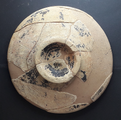VA·16: Difference between revisions
No edit summary |
No edit summary |
||
| Line 3: | Line 3: | ||
|reading_lepontic={{c|A|A22|d}}{{c|K||d}}{{c|E||d}}{{c|Ś|Ś6|d}}{{c|I||d}} | |reading_lepontic={{c|A|A22|d}}{{c|K||d}}{{c|E||d}}{{c|Ś|Ś6|d}}{{c|I||d}} | ||
|direction=dextroverse | |direction=dextroverse | ||
|letter_height_min= | |letter_height_min=2.3 cm | ||
|letter_height_max=2.6 cm | |||
|letter_number_min=5 | |letter_number_min=5 | ||
|word_number=1 | |word_number=1 | ||
| Line 27: | Line 28: | ||
Images in {{bib|Veronesi 1990}}: tav. XIXe (drawing), {{bib|Morandi 2001}}: 13, no. 6 (drawing), {{bib|Morandi 2004}}: 603, fig. 16.116 (drawing) and tav. XVII.116 (photo). | Images in {{bib|Veronesi 1990}}: tav. XIXe (drawing), {{bib|Morandi 2001}}: 13, no. 6 (drawing), {{bib|Morandi 2004}}: 603, fig. 16.116 (drawing) and tav. XVII.116 (photo). | ||
Inscribed | Inscribed upside-down in the middle of the bottom of the patera (length 4 cm), today mostly on one fragment; the upper tips of san are on another fragment, while the letter's lower tips and that of final iota are lost. The hasta of epsilon is scratched twice, and the second bar is prolonged toward the left, but no other reading than {{w||akeśi}} is feasible; both ''akei'' read by Volontè Fredini and ''akeni'' read by {{bib|Solinas 1995}}: 348 (after the inaccurate drawing in Veronesi) can be excluded. The form can be analysed as a genitive of a masculine personal name ''agedos'' or ''agedi̯os'' (see the word page), thus the inscription documents the use of kappa for /{{p||g}}/ and the use of san for /{{p||d}}/. An unusual feature at this late period is alpha with two hastae, which may be due to influence from Latin, or merely to sloppy execution. | ||
<p style="text-align:right;>[[User:Corinna Salomon|Corinna Salomon]] | <p style="text-align:right;>[[User:Corinna Salomon|Corinna Salomon]] | ||
{{bibliography}} | {{bibliography}} | ||
Revision as of 21:44, 18 December 2022
| Inscription | |
|---|---|
| Reading in transliteration: | akeśị |
| Reading in original script: | |
|
| |
| Object: | VA·16 Arsago Seprio (bowl) |
| Position: | bottom, outside |
| Orientation: | 180° |
| Direction of writing: | dextroverse |
| Script: | North Italic script (Lepontic alphabet) |
| Letter height: | 2.3–2.6 cm0.906 in <br />1.024 in <br /> |
| Number of letters: | 5 |
| Number of words: | 1 |
| Number of lines: | 1 |
| Workmanship: | scratched |
| Condition: | complete, damaged |
|
| |
| Archaeological culture: | Augustan [from object] |
| Date of inscription: | late 1st c. BC [from object] |
|
| |
| Type: | unknown |
| Language: | Celtic |
| Meaning: | 'of Akeś(i)os' |
|
| |
| Alternative sigla: | Morandi 2004: 116 |
|
| |
| Sources: | Morandi 2004: 601 no. 116 |
Images
Commentary
First published in Volontè Fredini 1990: 68, 71 f.
Images in Veronesi 1990: tav. XIXe (drawing), Morandi 2001: 13, no. 6 (drawing), Morandi 2004: 603, fig. 16.116 (drawing) and tav. XVII.116 (photo).
Inscribed upside-down in the middle of the bottom of the patera (length 4 cm), today mostly on one fragment; the upper tips of san are on another fragment, while the letter's lower tips and that of final iota are lost. The hasta of epsilon is scratched twice, and the second bar is prolonged toward the left, but no other reading than akeśi is feasible; both akei read by Volontè Fredini and akeni read by Solinas 1995: 348 (after the inaccurate drawing in Veronesi) can be excluded. The form can be analysed as a genitive of a masculine personal name agedos or agedi̯os (see the word page), thus the inscription documents the use of kappa for /g/ and the use of san for /d/. An unusual feature at this late period is alpha with two hastae, which may be due to influence from Latin, or merely to sloppy execution.



